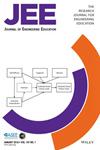Exploring supports for belonging as predictors of student outcomes: Different roles of co-curricular and extracurricular activities in engineering by students' year in college
Abstract
Background
Although most engineering colleges offer a variety of co-curricular and extracurricular activities to enrich students' sense of belonging to the college, existing literature has not fully captured whether and how the various activities serve to support students' sense of belonging and predict student outcomes.
Purpose
We investigated how engineering students perceive diverse activities as supports for their sense of belonging, and how these perceptions predict their engineering motivation, persistence, and achievement depending on their year in college.
Method
Five thousand eleven first- to fourth-year students from the College of Engineering of a four-year, public university participated in a longitudinal, multicohort study. They reported their engineering-related motivation, persistence, and perceptions about the extent to which four types of activities (i.e., university programs; college programs; co-ops/internships and course teamwork; student organizations and research) contributed to their sense of belonging (i.e., served as supports for belonging). Multigroup structural equation modeling was conducted to examine the relations among supports for belonging and academic outcomes, with a focus on the variation depending on students' year in college.
Results
Co-ops/internships and teamwork in courses were significant predictors of adaptive academic outcomes for all students regardless of their college year. This relation was stronger among third- and fourth-year students than among first- and second-year students. For first-year students, enhanced belonging supported by university programs significantly contributed to their motivation and identity.
Conclusions
Institutional efforts to enhance students' sense of belonging should be tailored to meet the evolving needs of students as they advance through their college experience.


 求助内容:
求助内容: 应助结果提醒方式:
应助结果提醒方式:


